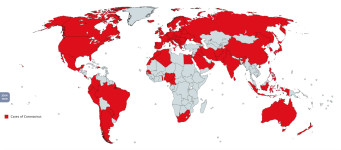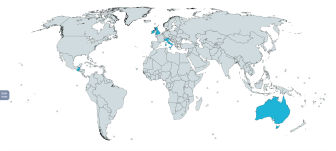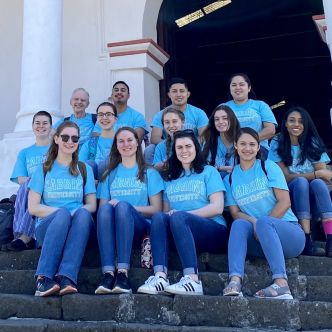On Tuesday, March 3, Dr. Donald Taylor issued a statement via email regarding the university’s position on the coronavirus outbreak, formally known as COVID-19.
In the statement, Taylor noted that “out of an abundance of caution and as advised by the CDC, Cabrini is postponing or canceling University trips to foreign countries.”
Cabrini is among several universities and colleges who have issued a statement concerning study abroad programs. On March 1, 2020, the Center for Disease Control (CDC) issued a statement urging institutions of higher education (IHE) to “ consider postponing or canceling upcoming student foreign exchange programs. IHE should consider asking current program participants to return to their home country.”
As of March 5, the CDC identified China, Italy, Iran and South Korea as a Level 3 risk. At this level, the CDC warns of “widespread community transmission” and suggests travelers “avoid nonessential travel” to the country.


How long will this last for?
There is not a definitive time slot of how much far in advance the university-sponsored international trips will be canceled.
Brian Eury, chief of staff and vice president for community development and external relations, noted that the university is monitoring and following the recommendations of the American College Health Association and the CDC. Future travel plans will also depend on COVID-19’s level of progression.
“We don’t have a crystal ball…,” Eury said. “I can’t say we are doing an automatic six months, when in a month and a half from now, it may be subsided. ”
How does this affect students studying abroad?
Currently, there are only students in Argentina, Australia and England. There are no students In Italy or currently participating in the Semester at Sea program.
According to Dr. Paul Wright, the study abroad coordinator and English professor, the university has not forced any student studying abroad to return home. They have left the decision up to the students and their families.
“What we’ve done is shared with those students and their families all of the CDC recommendations and suggested to them that it might be wise to consider a return home at this time,” Wright said.
As of March 6, Wright said that no students have chosen to return home.
Why have students chosen to stay abroad?
Sophia Scarpone, junior biology major, and Kailey Currao, junior education and English major, are both spending the semester in Fremantle, Australia. Having left in February, they plan on remaining in Australia for the duration of the semester.
“We felt that this decision to stay was safer compared to coming home,” Scarpone said. “Especially if we were to be on three flights [to come] home.”
Alexis Goldstein, junior criminology and sociology major and Spanish minor, received Taylor’s email a day before her scheduled departure to study abroad in Buenos Aires, Argentina.
Despite the warning, Goldstein proceeded with her plans to spend the semester abroad… She was determined to see it come to fruition, as the trip required significant preparation on Goldstein’s behalf.
“There was no way that email was stopping me from going,” Goldstein said.
Although she acknowledges that she might be sent home early, Goldstein is set to spend the entire semester abroad.
“I understand if the school I attend here shuts down…however Cabrini can’t send me home unless CDC demands it or my school here shuts down,” Goldstein said.

Had she canceled the trip, Goldstein would have been a whole semester behind in credits, ultimately threatening her ability to graduate on time.
Who else does this affect?
However, the news was disappointing to the faculty and students in the ENG 289 class On Stage: Live in London, who planned on visiting London in May.
The course, co-taught by Dr. Michelle Filling-Brown and Dr. Seth Frechie, have spent the semester studying British theater. At the cumulation of the semester, the class planned to travel to London for a study abroad component, which included live theatrical performances.
The domestic portion of the course will be completed and students will receive credit, but the abroad portion is canceled.
“For this course, most of the written work is completed throughout the semester and strongly consists of researching different aspects of the city of London. Because we are no longer traveling, we are now unable to visit the sites that we have been studying for the past few months,” Julia Taylor, criminology & sociology major, said. Taylor was planning on going to London to fulfill a minor requirement.
“Although the subject matter is still interesting, it will diminish our ability to fully appreciate the different attractions that London has to offer,” Taylor said.
Brittany Romano, junior social work and gender and body studies major, was very disappointed, but not surprised to hear the news. She foresaw it coming during spring break when several colleges and universities started pulling their students out of programs in Italy.
Her suspicions were confirmed after receiving Taylor’s email.
My initial reaction was shock…,” Romano said. “I wasn’t really surprised, but more so shocked in an ‘I can’t believe this is happening right now.”
Although Romano acknowledges that the trip cancellation is in the best interest of the students, she’s nonetheless disappointed.
“This was my one chance to study abroad, and I’ve wanted to study abroad in college ever since I was little, and now that opportunity was taken from me so suddenly and quickly…,” Romano said. Hopefully, though, I’ll make it to London eventually, now just wasn’t the time I guess.”
Filling-Brown, dean of the school of humanities and social sciences, expressed sadness about the trip’s cancellation. She was especially sorrowful because students would miss out on an opportunity to study abroad.
“I studied abroad when I was an undergraduate student and it was such a powerful experience for me,” Filling-Brown said. “All I want to is to give that to our students.”
In the midst of disappointment, she stressed the importance of students’ safety.
“I know that we are making the right choice just for the safety and health of our students,” Filling-Brown said.
In lieu of London, Filling-Brown hopes that she and Frechie could take students on alternative co-curricular activities, such a local theatrical performance. All of these plans are contingent on the domestic situation.
The university cancellation of international trips goes beyond student academic programs.
Fr. Carl Janicki, director of campus ministry, noted that their immersion trip to Ecuador in May and the pilgrimage to Lourdes, Paris and Oberammergau in August had also been canceled.
Moving Forward
Eury noted that the university has been monitoring COVID-19 since January. In response, a task force has been created to establish a plan in the event that the virus would spread to campus.
Aside from this plan, the university has already established an emergency operations plan.
Despite the risk COVID-19 poses to the health of the Cabrini and the surrounding community, Wright reminds the Cabrini community to not let fear control how they treat others.
“We don’t want to create a climate of being less welcome than we ought to be,” Wright said.



